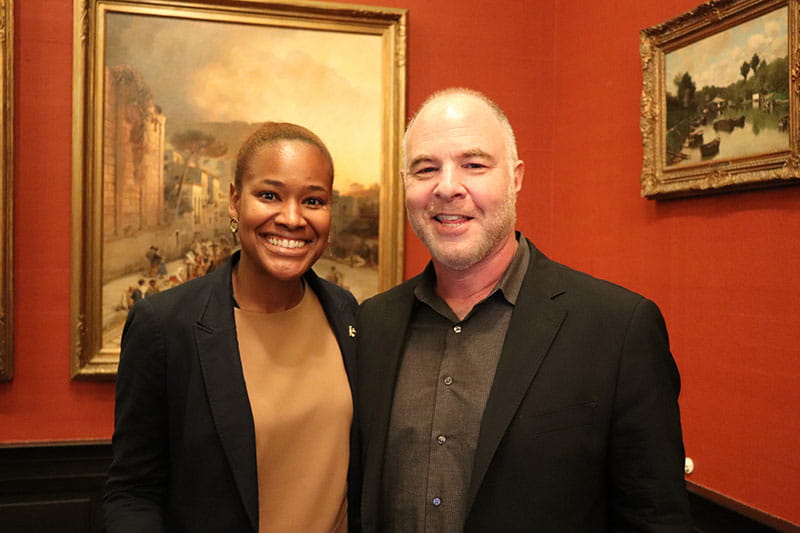Jackson Katz, PhD, Brings Introspection, Recommended Action in Gender-based Violence Lecture

- Ribbon-Cutting Ceremony Marks Official Unveiling of Drexel Station at 30th Street
- Express Your Thoughts About Climate Change in the Anthems for the Anthropocene Contest
- 40 Years Ago, Drexel Made Computer — and Apple — History
- Drexel Helps Promote Philadelphia as a Premier Destination for Global Education

Drexel University Vice Provost for Academic Programs and Strategic Initiatives Koren A. Bedeau, PhD, had no idea just how topical the lecture on gender-based violence co-sponsored by her office and the Office of Student Life would be when she settled with the speaker, Jackson Katz, PhD, on a date for the event months before.
Bedeau let the audience gathered in the A.J. Drexel Picture Gallery on the evening of Oct. 10 for the lecture — titled “Gender Based Violence: Who’s at Fault?” — know this right off the bat.
“I had no idea that we’d be hosting this program on the heels of yet another national polarizing debate,” Bedeau said referencing the recent swearing in of Brett Kavanaugh as an associate justice of the U.S. Supreme Court following public testimony and an FBI inquest into accusations that Kavanaugh had sexually assaulted a woman in high school.
“However when we made the invitation to our speaker, I did so with the awareness that at Drexel, we’re not immune to the realities of gender-based violence,” Bedeau said. “… I applaud all of you for being here, and hope even after the program, you remain motivated to engage in difficult conversations and reflect on ways that you can be an active contributor to challenging acts of violence and to maintaining a supportive and accountable campus community.”
“However when we made the invitation to our speaker, I did so with the awareness that at Drexel, we’re not immune to the realities of gender-based violence,” Bedeau said. “… I applaud all of you for being here, and hope even after the program, you remain motivated to engage in difficult conversations and reflect on ways that you can be an active contributor to challenging acts of violence and to maintaining a supportive and accountable campus community.”
“I’ve spoken in a lot of rooms, but never a room like this,” Katz said. “It’s pretty cool. We’ll try to do justice to the artistic affectations in our surroundings during this presentation.”
Despite this, Katz did not sugar-coat his plans nor his intentions for his address.
“I’m going to say some really provocative things in the short time we have together this evening because life is short, and we have some really big problems in our society and in the world,” he said. “I’m hopefully going to give you some ways to think about those problems, and potentially some solutions.”
Katz launched into his view that using the umbrella term of “women’s issues” for domestic violence and sexual assault is problematic because it allows men to divert their attention.
“I have a problem with that frame and I don’t accept the premise,” he said. “In fact, I’m going to argue that these are men’s issues.”
His reasoning for this is due to the fact that passive language and ideas that omit the male involvement in these issues — and the lack of discussion about the societal pressures which men face that can lead to these actions — are rarely discussed and lead to this vicious cycle.
“People will say, ‘How many women were raped on college campuses last year?’ instead of, ‘How many men raped women on college campuses last year?’” he said. “… In these cases, the use of passive language and the passive voice has a very powerful political effect. This effect shifts focus off of the group with more power onto the group with less. This is not a coincidence. It’s not sloppy thinking. It’s how power functions.”
Another example of this? The phrase “violence against women.”
“It’s a passive construction,” he said. “There’s no active agent in the sentence. No one is doing anything to them. They’re just experiencing it, kind of like the weather. If you introduce an active agent – ‘men’s violence against women’ – it doesn’t roll off the tongue as easily, but it sounds active.”
The downfall of changing this rhetoric to be so “honest,” Katz said, is that it leads men to push back, giving rise to things like the men’s rights movement and the use of terms like “Feminazi.” Katz even asked if anyone in the room had been called that name before, which prompted a few hands to be raised.
Another under-discussed topic, said Katz, is the abuse against men and boys themselves, as well as those who witness abuse in the home.
“Men have been sexually assaulting other men and boys for thousands of years … but we’ve been talking about this in a public way for just the last 15 years,” Katz said.
“Men have been sexually assaulting other men and boys for thousands of years … but we’ve been talking about this in a public way for just the last 15 years,” Katz said.
“We have to acknowledge men’s pain and suffering, but see it within a systemic force of patriarchal power,” Katz answered.
Then Katz explained his thoughts about the concepts of an “accuser” and a “bystander.” He said that the term “accuser” is both widespread and problematic because it makes the perpetrator seem like a victim of the accusation. He added that the word was popularized during the Kobe Bryant sexual assault case, and has also run rampant in recent cases like that against Bill Cosby.
“The word accuser is everywhere. … and it’s on steroids in the Kavanaugh case,” he said. “I’m going to argue that this is a giant step backwards for our society, for gender equality and for caring about the victims of sexual and domestic violence.”
A “bystander,” however, carries a much more positive connotation. In fact, being a good bystander, which Katz defined as anyone in a peer culture who is not a perpetrator or a victim of sexual violence, is where people can start making a difference and turning things around on a larger scale. He will address this concept in a new film called “The Bystander Moment: Transforming Rape Culture at its Roots.” Katz played the trailer for the audience, giving them a sneak peak
A “bystander,” however, carries a much more positive connotation. In fact, being a good bystander, which Katz defined as anyone in a peer culture who is not a perpetrator or a victim of sexual violence, is where people can start making a difference and turning things around on a larger scale. He will address this concept in a new film called “The Bystander Moment: Transforming Rape Culture at its Roots.” Katz played the trailer for the audience, giving them a sneak peak
“To me, the hardest and most important work isn’t about, ‘What are you going to do at a party if you see rape?’ No, it’s as a guy, ‘How are you going to conduct yourself 24/7 around your friends, your peers, your fraternity brothers, your team mates, your co-workers, your colleagues, to make sure it’s clear that you’re not going to accept an incident of abuse or the attitudes that lead to it?’”
Despite the seriousness of these topics and the resulting discussion, Katz shared several laughs with his audience during the lecture. Attendees also walked away with handouts spelling out 10 things men can do to prevent gender violence, as well as a list of further resources recommended by Katz.
During a final Q&A session, fifth-year electrical engineering student Amy Shapiro asked about how women can get men to believe that other men are sexual predators, bringing up the concept of “the missing stair,” or a predator who is discussed clandestinely instead of being confronted. Katz’s answer was simple.
“We have to raise our expectations,” he said. “We need to do better than this. If someone is abusive, we can’t just turn an eye and accept it.”
Resources at Drexel for those affected by sexual and gender-based harassment and misconduct, including confidential resources and reporting options, can be found on OED's Title IX Resource Page.
In This Article
Drexel News is produced by
University Marketing and Communications.
